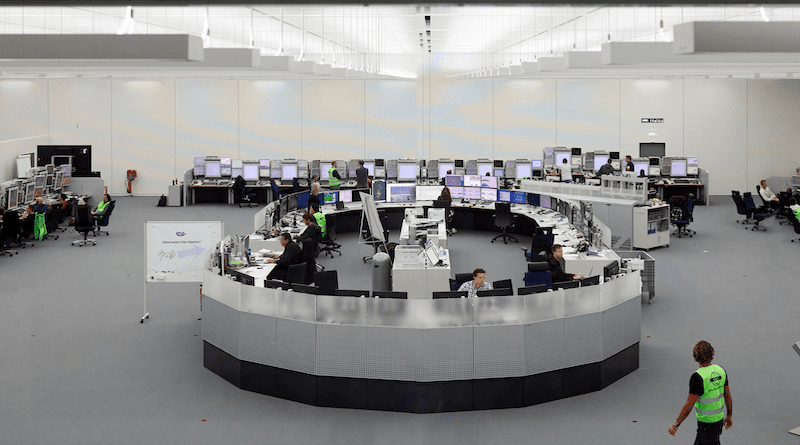Indra Drives Modernization Of German And European Skies With Commissioning Of State-Of-The-Art System At Munich Control Center
he Munich control center of DFS, the German air navigation service provider, now manages flights in its airspace in southern Germany, one of the busiest and most complex regions in Europe, with the latest version of the state-of-the-art iCAS system, part of the iTEC alliance’s range of solutions.
The solution, supplied and implemented by Indra, is one of the most advanced in the world and it constitutes a breakthrough in the automation and the improvement of capacity. It provides a cutting-edge set of tools to manage the future growth of air traffic in the area in the safest, fastest and most efficient manner from an environmental standpoint and improves its interoperability with other European control centers.
The Munich Phase-II iCAS system is the first one based entirely on 4D trajectories to be put into operation in a complex terminal maneuvering area (TMA). The flight path management system can accurately calculate the future position of each flight over time and facilitate optimal planning and advanced and innovative management of conflicts, so that these may be minimized, detected and resolved at an early stage. This feature, combined with highly advanced control procedures, considerably increases the levels of efficiency, capacity and safety.
The system’s flexibility is also an important factor that contributes to optimizing performance, as it permits more direct flights and cuts delays while it benefits the environment by reducing CO2 emissions and noise pollution.
“iCAS is our answer to the digital European sky. It enhances the technical interplay between European air navigation service providers. It provides precise flight path calculations, a modern human machine interface and additional functions. This facilitates planning and allows our air traffic controllers to perform forward-looking, state-of-the-art air traffic management”, declared Dirk Mahns, Chief Operating Officer (COO) at DFS.
Javier Ruano, Managing Director of Indra’s of Indra’s ATM business, explained that “the new system in Munich provides an excellent technological basis for more effective and efficient traffic management systems and air navigation services in Europe, assets that are key to overcoming the challenges of a complex and saturated airspace”.
The Munich control center monitors the lower airspace that stretches over central and southern Germany and coordinates arrivals and departures at the airports in Munich, Memmingen, Nuremberg, Leipzig, Erfurt and Dresden. Last year it handled about 860,000 aircraft movements with around 350 air traffic controllers.
Progress of the Single European Sky
The next-generation iCAS II system has been developed by Indra in partnership with DFS and LVNL, the Dutch air navigation service provider. This deployment is part of the plan envisaged by the iTEC alliance, of which the air navigation service providers of Germany, the United Kingdom, Spain, the Netherlands, Norway, Poland and Lithuania are members, together with Indra as a technology partner.
The success of the Munich control center project will also enhance Indra’s position as a technological partner of DFS in Germany. The company has already implemented the iCAS system at the Karlsruhe control center and in late 2022 it was awarded a major contract to modernize the country’s entire network of air surveillance radars with state-of-the-art technology.
Global leadership
Indra is the leading air traffic technological engineering company that is defining the way we fly and manage the skies of the future to ensure even safer, more efficient and sustainable aviation. It has deployed over 6,000 installations in more than 90% of the world’s countries and its technology can be found on the flights of over 85% of passengers during at least one phase of their trip.
Indra is one of the first companies in the world to commission 4D-trajectory air traffic management systems, digital and remote control tower systems, digitized IP communications and 3D radars capable of withstanding the effects of wind turbines. It is anticipating the future and designing drone traffic management systems (UTM/U-Space), as well as satellite-based

